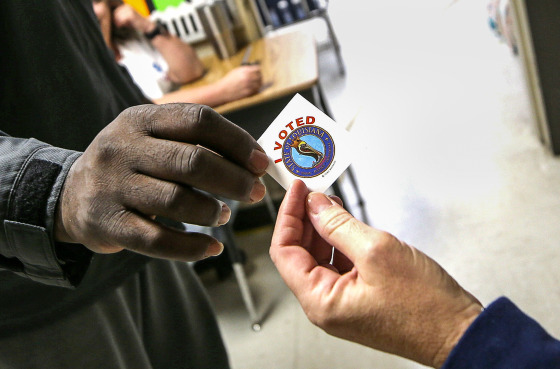WASHINGTON — The Supreme Court on Monday tackled an unusual case in which civil rights groups are in a tentative alliance with Republican officials in defending a Louisiana congressional map that includes two majority Black districts for the first time in decades.
The justices heard oral arguments in an appeal brought by the state over its efforts to draw a map while being sued from the left and right about whether it appropriately considered race in doing so.
As in previous cases on these issues, some conservatives on the court questioned whether the landmark 1965 Voting Rights Act's requirement that race be considered when drawing districts is compatible with the Constitution's 14th Amendment, which conservatives say bars any consideration of race.
The Supreme Court's 6-3 conservative majority is often receptive to conservative claims that the Constitution is “colorblind,” meaning no consideration of race can ever be lawful even if it is aimed at remedying past discrimination.
But while there might be an appetite on the court to potentially strike down a key provision of the voting rights law at some point, the Louisiana dispute does not squarely raise the legal question, so the court could be more likely to uphold the map in a narrow ruling.
As recently as 2023, the court reaffirmed the Voting Rights Act in a congressional redistricting case arising from Alabama. The vote was 5-4, with two conservatives, Chief Justice John Roberts and Justice Brett Kavanaugh, joining the court's three liberals in the majority. The Louisiana case could end up with a similar lineup.
The case has a complicated history, resulting from an original map drawn by the Legislature after the 2020 census that included just one Black majority district out of the state's six districts. About a third of the state's population is Black.
Civil rights groups, including the Legal Defense Fund, sued and ultimately won, arguing that the Voting Rights Act required two majority Black districts.
That led to a new lawsuit filed by a group of self-identified "non-African American" voters led by Phillip Callais and 11 other plaintiffs who said the latest map, which is currently in effect, violated the 14th Amendment.
A federal court struck the new map down, but the state successfully asked the Supreme Court to block the ruling last year, meaning the map was used in November's election. Rep. Cleo Fields, D-La., ultimately won the newly drawn district.
Now, the Supreme Court is deciding whether the 2024 map can remain in place, weighing several legal questions.
During the argument, Kavanaugh repeated concerns he raised in the 2023 case that there should be an end point for race to be considered in redistricting, indicating he could eventually be a vote to strike down Section 2 of the Voting Rights Act.
"The court has long said that race-based remedial action must have a logical end point, must be limited in time, must be a temporary matter," Kavanaugh said.
Conservative Justice Neil Gorsuch asked similar questions.
"Isn't saying race was one consideration another way of saying race predominated? And how do we square that with the 14th Amendment's promise that race should play no role?" he asked.
Roberts, meanwhile, questioned whether the congressional map met redistricting criteria because the newly drawn second majority Black district is not sufficiently compact. He described it as a "snake that runs from one of the state to the other."
Several justices, perhaps seeing an easy way to resolve the case, focused on precedent saying that states need leeway to draw the districts of their choosing. Other Supreme Court precedent says states are free to consider partisan politics as part of that calculation.
Liberal Justice Elena Kagan said that in drafting the new map, the state was focused on politics, not race, because it drew the lines in a way that protected Republican incumbents, including House Speaker Mike Johnson.
"If the state can't do that, the state has no breathing room," she added.
In a similar vein, liberal Justice Sonia Sotomayor said that based on the earlier Voting Rights Act litigation, the state had a "good faith basis" for believing it needed to comply with the law.
Fellow liberal Justice Ketanji Brown Jackson pointed out that the Supreme Court has never held that race is a key factor when states are drawing maps to comply with the Voting Rights Act.
"I thought we suggested the opposite," she added.
In defending the new map, Louisiana Solicitor General Benjamin Aguiñaga wrote in court papers that currently the state is being sued no matter what it does, causing it to spend millions of dollars on legal expenses.
"No one truly wins that fight — the state loses, its voters lose, the judiciary loses, and democracy itself loses," he wrote.
The challengers said in court papers that the new map constitutes an "odious racial gerrymander." None of the state's reasons constitute a "compelling justification for violating the 14th Amendment," they added.

